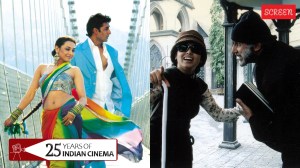Policing not tailored to serve interests of any specific religious, cultural community: Delhi HC on plea by purdanashin woman
The woman had sought sensitisation of the Delhi Police on religious and social customs and practices of all women who observe purdah, belonging to any religion, guaranteed under Article 21 of the Constitution of India.
 The observations came as the HC disposed of a plea by a “purdanashin” (veiled) Muslim woman seeking an impartial probe after she was allegedly taken to the police station and wrongfully detained without her veil. (Express file photo)
The observations came as the HC disposed of a plea by a “purdanashin” (veiled) Muslim woman seeking an impartial probe after she was allegedly taken to the police station and wrongfully detained without her veil. (Express file photo)Policing is not tailored to serve the interests of any specific religious or cultural community alone and rather, has to be guided by the principles of impartiality, fairness, and reasonability, the Delhi High Court said on Friday.
Stating that it cannot issue “faith-based directions” for police officers investigating criminal cases, a single-judge bench of Justice Swarana Kanta Sharma, in its 64-page judgment, observed that law-enforcement agencies, while respecting cultural sensitivities and religious practices, must “prioritise the common good and uphold the law without discrimination”.
The observations came as the HC disposed of a plea by a “purdanashin” (veiled) Muslim woman seeking an impartial probe after she was allegedly taken to the police station and wrongfully detained without her veil. In the final hearing, the “person-oriented prayers” raised by the woman were satisfied and withdrawn, the judgment noted.
The court went on to adjudicate whether the concept of a “purdanashin woman” refers to women who by virtue of their gender need to be extended special treatment, as it was argued that many women even today are “purdanashin out of their own choice”, or because they follow their respective religious practices.
The woman had sought sensitisation of the Delhi Police on religious and social customs and practices of all women who observe purdah, belonging to any religion, guaranteed under Article 21 of the Constitution of India.
Justice Sharma observed that police investigations can’t have any “room for anonymity” as identification is essential for ensuring justice and maintaining security.
“…it is important that law enforcement agencies have the authority to identify individuals when necessary, in order to maintain public order, regardless of veiling practices and also regardless of the fact that whether these practices would be covered under Article 25 (freedom of religion) in the Constitution or not,” the HC said, adding that a court’s directions must be rooted in legal principles, rather than being influenced by religious considerations.
The HC further observed that the “concept of purdanashin woman is essentially a legal concept, not in context of any religious practice, but in respect of capacity to enter into a contract”. It said that the concept in Indian law essentially revolves around “seclusion of a woman from the outer world and society at large resulting in their lack of understanding of societal affairs”, and is less relevant in modern era, especially in the big cities, “considering the background and the lifestyle of modern women”.
Referring to the “Ramayana & Mata Sita, and Brihadaranyaka Upanishad”, the HC said they point out that neither “Hindu women practised any purdah nor was it mandatory for them”.
It, thereafter, said that in Hindus, there is “no mandatory provision to wear veil or ghoonghat, or Hindu women being purdanashin by virtue of their religion”. The scenario was the same for Sikh women, the court said while adding that everyone can make individual choices in India.
It further said that law enforcement agencies cannot be driven by religious practices but have to be “community and safety driven”, adding that it cannot issue “faith-based directions” for the police officers investigating criminal cases, “lest it affects their power to investigate as provided to them by law”.
On the practice of wearing hijab or burqa in Islam, the court said that whether such practices fall under “essential religious practice”, so as to be covered within the ambit of Article 25, is pending before the Supreme Court, and there is “nothing at this stage to prove that wearing a purdah, or burqa as called in Islam, would be an essential religious practice”.







